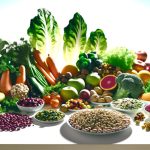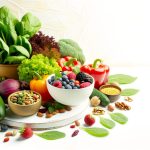A vegan or plant-based diet does not include any animal products, such as beef, milk, and eggs. A vegan diet, if adhered to properly, can be a very nourishing way of eating, decreasing the odds of developing chronic illnesses and helping to shed unwanted pounds.
The amount of folks transitioning to vegan diets is on the rise, largely due to concerns over health, animal welfare, or the environment. According to a survey conducted in 2018, only 3% of Americans have adopted a completely vegan diet. However, the sales of vegan food items have increased.
Vegan diets are generally packed with nutrients and have a low content of saturated fats. Studies indicate that following a vegan diet can be beneficial for cardiovascular health, may lessen the chances of cancer, and can help reduce the likelihood of type 2 diabetes.
People who consume only plant-based foods must be cognizant of how to get certain nutrients, like iron, calcium, and vitamin B-12, that typically come from a diet that includes both plant and animal products.
What Is A Vegan Diet?
A vegan diet involves eating only foods comprising plants. This diet requires abstaining from any and all animal-based foods, such as meat, dairy, and eggs. Some people also avoid eating honey. For some, they have chosen to follow a vegan diet, while others have decided to embrace a vegan lifestyle.
Individuals who opt for veganism may also abstain from wearing clothes, using soaps, and other items that are created from or have components of animals, such as leather and fur. Some embrace this way of living due to its positive environmental impacts as an eco-friendly diet.
Vegan meals are often composed of abundant amounts of fruits, vegetables, legumes, nuts, and seeds. Consuming multiple types of food will offer an extensive selection of essential vitamins, minerals, beneficial fats, and protein.
Those on this eating plan should be sure to obtain the essential minerals and vitamins that are usually found in animal-based food products. These essential components are iron, protein, calcium, vitamin B-12, and vitamin D.
Purium’s MVP Family is packed with vitamin D, plant-powered protein and other whole food nutrients for optimal absorption and all-day energy. Its natural chocolate flavor is delicious and kid-approved!
Vegan vs. Vegetarian
The primary distinction between vegetarians and vegans is that vegetarians abstain from consuming meat (such as cows, pigs, chickens, and fish) but they will still ingest dairy products, eggs, or both. The vegan diet excludes all products with animal-based ingredients.
A vegan diet is more limited, so one should be extra mindful of where nutrients are sourced to make sure their daily nutritional needs are met.
Health Benefits
A vegan diet can supply all the necessary nutrients, and at the same time, avoid some of the potential health risks linked to unhealthy animal fats. Investigations have connected veganism with a variety of health advantages, like the ones listed.
Better Heart Health
Vegan diets can boost heart health in several ways. The results of a comprehensive 2019 survey showed that consuming more plant-based foods and fewer animal-based foods could help lower the risk of developing heart disease and dying in adults.
The primary components of one’s diet that contain saturated fats are animal products such as meat, cheese, and butter. The AHA states that consuming items which are high in these kinds of fats can raise cholesterol levels. Having a high amount of cholesterol can raise the probability of having a heart attack or stroke.
Vegetables and other plant-based foods are rich in fiber, which has been associated with improved cardiovascular wellbeing according to the American Heart Association. Plant-based vegetables and grains are the most beneficial when it comes to fiber, while animal products contain a negligible amount or none at all.
Furthermore, individuals who adhere to a vegan lifestyle usually consume fewer calories than people who eat a typical Western diet. Consuming an appropriate number of calories could result in a lower BMI and a decreased chance of obesity, which is a major contributor to coronary artery disease.
Lower Cancer Risk
A 2017 review suggests that individuals who follow a vegan diet may have a 15% lower risk of developing cancer. It appears that plant foods are responsible for this health advantage, which can be attributed to the fact that they contain a lot of fiber, vitamins, and phytochemicals. These phytochemicals are organic substances produced by plants, and they safeguard against cancer.
Studies have yielded conflicting outcomes regarding the influence of diet on the probability of particular cancers. Nevertheless, it is likely that red meat can cause cancer, with studies finding it to be mainly linked to colorectal cancer but also to prostate cancer and pancreatic cancer.
The agency also states that consuming processed meat may increase the risk of colorectal cancer, as it has been considered to be carcinogenic. Taking out red and processed meats from one’s diet eliminates the potential dangers associated with them.
Weight Loss
Individuals who consume a vegan diet usually have a lower body mass index compared to those who follow other types of diets. In 2015, a study concluded that vegan diets had a greater impact on weight loss than omnivorous, semi-vegetarian, and pesco-vegetarian diets, and additionally provided the essential macronutrients more effectively.
Replacing high-calorie and fatty animal products with lower calorie plant-based foods can be an effective way to maintain a healthy weight.
It is essential to keep in mind that consuming a lot of processed or high fat plant-based items, which are sometimes referred to as a “junk food vegan diet,” can cause an increase in weight that is not good for your health.
Lower Risk Of Type 2 Diabetes
A comprehensive review from 2019 has indicated that adhering to a plant-based diet can help decrease the chances of developing type 2 diabetes. This study showed that the positive effect was connected to the consumption of healthy plant-based food items such as fruits, vegetables, whole grains, nuts, and legumes.
What To Monitor On A Vegetarian/Vegan Diet
It is evident that your diet involves more than just the food you consume; it is a conscious decision, a way of life, and a reflection of your identity. Eating can be the answer to realizing your health goals, raising your wellbeing, and making you feel like a part of a group or collective.
Some individuals have a more positive reaction to diets that are centered around animal products, while others report feeling better when they consume diets that are based on plants. You can achieve optimum health while following a vegetarian or vegan diet.
Those who do not eat meat, such as vegans and vegetarians, may be prone to some nutritional deficiencies while avoiding others. In this article, the main potential hazards are outlined along with the assessments that can be performed to make sure your dietary intake is properly balanced.
Important Nutrients
1) Iron
The most widespread nutritional deficiency globally is an iron deficiency, primarily caused by not consuming enough food. People who follow a vegetarian or vegan diet are particularly likely to be deficient in iron due to the absence of heme iron in their meals. Iron that is derived from animal sources (such as meat, fish, and poultry) is known as heme iron and is more readily absorbed by the body. In contrast, non-heme iron, which is found in plant sources, is not as easily taken up by our digestive system.
Furthermore, plants are often high in phytates and polyphenols, substances that stop the body from taking in iron. Calcium and certain proteins from both animal and plant sources (including dairy and eggs, as well as soy) can impede iron absorption. Research has indicated that due to all the criteria mentioned, individuals who follow a vegetarian diet could have their iron absorption reduced by up to 85% in comparison to those who consume both plants and animals.
It is beneficial to monitor your iron levels if you are following a vegetarian or vegan eating plan. Better yet, check your ferritin levels. Blood iron levels can be impacted by what you’ve recently eaten, however ferritin is not, which makes it a more accurate representation of the iron your body has stored. Not surprisingly, people on plant-based diets tend to have less than ideal nutrition.
If your iron levels are low, here is a helpful tip to boost them – take vitamin C. Vitamin C (ascorbic acid) has the ability to attach to iron and ensure it is effectively taken in by the digestive system. You can increase your intake of vitamin C by adding a dash of lemon juice to your salads. Reduce your intake of tea, coffee, and dairy near when you eat – these will decrease the amount of iron that your digestive system can take in.
2) Zinc
Zinc is found in seafood, meat, eggs, and dairy. However, it can also be located in whole grains, beans, and seeds. Why is it that people who follow a vegetarian or vegan diet are more likely to lack zinc, even though it can be found in plant-based foods?
Due to the phytates present in plant sources, absorption of zinc is inhibited. Research appears to indicate that vegetarian diets take in approximately 35% less zinc than diets that include meat. It has been proposed that vegetarians may need to ingest as much as half again as much zinc as non-vegetarians.
Are your zinc levels optimal? If you see your zinc levels dropping, it may be time to revise your eating habits. You can boost your zinc levels by consuming pumpkin seeds, nuts, and beans, or by taking a supplement. It is essential to consult your physician prior to consuming any dietary supplements as they could conflict with your medical condition or prescribed medications.
3) Vitamin B12
Brain function and the production of DNA and red blood cells are dependent on Vitamin B12. Mostly, it is discovered in animal-based items like meat, eggs, and dairy products. When vegetarians do not consume enough eggs and dairy, they can become deficient in Vitamin B12, while vegans must take Vitamin B12 supplements.
Vegetables, algae, and mushrooms all contain certain amounts of vitamin B12. Noteworthy figures have been stated in pickled vegetables, including sauerkraut, natto, and tempeh. Nevertheless, the concentration of vitamin B12 in any of these foods is either minuscule or inconsistent.
Neither of these items can be relied upon as a consistent and adequate supply of vitamin B12. The amount of vitamin B12 in these foods is contingent on whether or not bacteria are present in the soil or among the fermenting microbes, though they don’t necessarily have to be.
The liver is able to retain vitamin B12, so it could take a long time before a lack of B12 intake becomes a full-blown B12 deficiency. At this point, your vitamin B12 levels could appear to be okay, though they may not be at their most beneficial amount for your health.
It is possible to keep track of your vitamin B12 levels with a straightforward blood test. If you have been consuming a plant-based diet for a long time or are currently doing so, you should adjust your eating habits to make sure you have enough vitamin B12.
4) Vitamin D
The sun is the ideal source for obtaining your daily dose of vitamin D. Many people are not exposed to enough sunlight, usually because of the weather or their occupations. That’s when diet becomes important. Vitamin D has a major influence on one’s state of mind, the body’s defense against illnesses, and the power of the muscles.
Some studies suggest that cholecalciferol (vitamin D3), which is present in fish and dairy products, is more powerful than the type of vitamin D found in plants (vitamin D2).
Those who choose to follow a vegetarian or vegan diet may be at risk of not having enough Vitamin D if they are not getting sufficient amounts of sun exposure. To get more vitamin D in your nutrition, choose mushrooms.
ZinC-ADE delivers specific, targeted, plant-sourced nutrients (Zinc and Vitamins A, C, D & E) to support a healthy terrain throughout the body while keeping with Purium’s pure, whole-food approach to immune support.
5) Calcium
Calcium is a controversial nutrient. Calcium is present in a variety of plants, but oxalates and phytates, which impede its absorption, can also be found. A lack of calcium can result in a decrease in bone mass and can eventually cause osteoporosis. Research suggests that vegans and vegetarians may be more likely to suffer from low bone mineral density.
Conversely, there is evidence that suggest plant-based foods are just as good, if not better, than dairy products when it comes to providing calcium. It is possible to monitor your blood calcium levels, which are usually regulated by the parathyroid hormone and vitamin D to remain within a limited range.
If the amount of blood decreases, calcium is taken from the bones. It is wise to examine your bone mineral density (z-score, t-score) at certain intervals as you age.
READ MORE: 12 Plant-Based Calcium Rich Foods
Plant-Based Food Ideas
It may seem difficult to make the transition to a vegan diet, but there are several easy and delicious options to ensure your meals are full of essential vitamins and minerals. Instead of cow milk, people can use plant-based alternatives.
Plant milks are typically lower in calories and have less saturated fat than cow’s milk. Manufacturers often enrich them with vitamins and minerals. People can opt to purchase dairy-free cheeses, yogurts, and butters or create them from scratch.
Some may be worried that they won’t get enough protein if they follow a vegan diet, however, there are many vegetables that are great sources of this nutrient. Products like tofu, tempeh, and seitan, all made from soy, supply protein and can give a consistency similar to meat in many meals.
Summary
Vegan diets are growing in popularity. A vegan lifestyle can lead to improved cardiac function, weight loss, and a decreased risk of developing long-term illnesses.
Studies indicate that vegan diets can be more beneficial for the environment. Those wanting to switch to a vegan lifestyle must strategize their meals in order to make sure they get the important vitamins and minerals they need to avoid being deficient.









